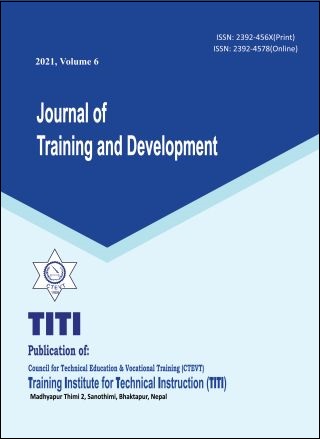Initiations of Employer Engagement in Training Delivery of TVET Programmes
DOI:
https://doi.org/10.3126/jtd.v6i01.41769Keywords:
Employer engagement, Industry Institute Linkage, Public Private Partnership, Training Delivery, Workplace-based TrainingAbstract
Engagement of employers in the Technical Vocational Education and Training (TVET) system is needed not only to increase the training capacity but to ensure the TVET is demand-driven, quality oriented, future focused and provides the economy with the skilled workers it needs. Employer engagement in TVET system covers a spectrum of cooperation and involves small participation to build the trust required to develop more robust long-term engagement strategies. Developing engagements with employer and employer’s associations at all levels of the training programmes life cycle facilitate the development of workable solutions for training-to-work transitions. The employer has a crucial role to play in the delivery of training programmes. Engagement of employer is an essential component of overall training programmes and leads to developing responsive labour market skill needs, supporting priority economic sectors, training design and development, training delivery and post training support to develop ongoing dialogue with employer and employer associations. The need to increase the engagement of employers in TVET programmes has been known for many years in the country, however, employer engagement in training delivery of TVET programme is under-explored in Nepal. This article addresses the existing situation, explores issues, and share some practicable initiations of employer engagement in the TVET programme.
Downloads
Downloads
Published
How to Cite
Issue
Section
License
Copyright (c) 2021 Rajendra Bahadur Shrestha

This work is licensed under a Creative Commons Attribution 4.0 International License.
Authors who publish with this journal agree to the following terms:
- Authors retain copyright and grant the journal right of first publication with the work simultaneously licensed under a Creative Commons Attribution License that allows others to share the work with an acknowledgement of the work's authorship and initial publication in this journal.
- Authors are able to enter into separate, additional contractual arrangements for the non-exclusive distribution of the journal's published version of the work (e.g., post it to an institutional repository or publish it in a book), with an acknowledgement of its initial publication in this journal.
- Authors are permitted and encouraged to post their work online (e.g., in institutional repositories or on their website) prior to and during the submission process, as it can lead to productive exchanges, as well as earlier and greater citation of published work (See The Effect of Open Access).




